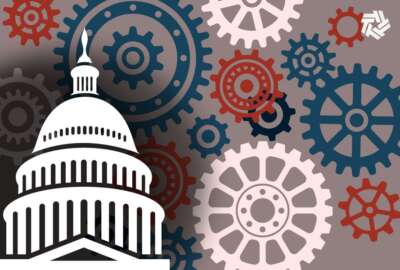
Omnibus silently endorses 4.6% pay raise for federal employees in 2023
Congress released the text of a massive government spending package for fiscal 2023, which includes an increase of $42.5 billion in non-defense spending and an ...
Best listening experience is on Chrome, Firefox or Safari. Subscribe to Federal Drive’s daily audio interviews on Apple Podcasts or PodcastOne.
For federal employees, the most significant part of the $1.7 trillion omnibus spending package that Congress unveiled this week may not be contained in the text of the legislation itself, but rather found in what’s not said.
The 4,155-page bill, which House and Senate lawmakers released in the early morning hours of Dec. 20, doesn’t make any reference to the 4.6% across-the-board federal pay raise, in effect silently endorsing the Biden administration’s proposal for 2023. The bill additionally supports a 4.6% pay raise for military members in 2023.
But there are still a couple of steps before the pay raise can become official in January. President Joe Biden must sign an executive order to implement the federal pay raise before the end of the calendar year, even after Congress passes the omnibus spending package.
Despite the planned raise, a pay freeze that’s been in place since at least 2014 would remain for the vice president, political appointees on the Executive Schedule, non-career ambassadors of the Foreign Service, non-career employees in the Senior Executive Service, as well as other senior political appointees at or above level IV of the Executive Schedule.
For the omnibus overall, Congress has until midnight on Dec. 23 to pass the series of bills and move it to Biden’s desk to be signed into law — if they want to avoid either a partial government shutdown or a pivot to another continuing resolution (CR). It’s the next step after Biden signed a one-week CR to keep the government running until just ahead of the holiday weekend.
At the top, the massive government funding legislation included $772.5 billion for non-defense discretionary programs, an increase of $42.5 billion since last year, spread across 12 different appropriations bills in the package. It also included $858 billion in defense funding, a $76 billion increase over the enacted 2022 level.
“This is the highest level for non-defense funding ever and a larger increase in both dollar and percentage than fiscal year 2022,” House Appropriations Committee Chairwoman Rosa DeLauro (D-Conn.) said in a Dec. 20 press statement.
The omnibus covers funding for most federal agencies, and for one, the Office of Personnel Management would receive $422 million for fiscal 2023 in the bill — a sizeable increase of $49 million over its enacted appropriations in 2022. Within that budget, $386 million would go toward OPM’s salaries and expenses, and another $36 million would be designated to OPM’s Office of Inspector General. About $19.3 million would go toward information technology modernization. For instance, OPM would have to “explore and evaluate” the potential expansion of self-service tools in the Federal Employees Health Benefits (FEHB) Program.
The legislation would additionally direct both OPM and the Office of Management and Budget to report to Congress on their plans to address ongoing issues with the federal hiring process. And OPM would have 90 days to analyze and report on how to best reform pay for federal wildland firefighters, as well as look into other pay-related initiatives, such as position classifications and work hours.
Another agency, the Merit Systems Protection Board, would receive $52 million for salaries and expenses. MSPB is tasked with protecting federal employees from partisan political practices by hearing employee appeals.
The Social Security Administration would receive $14.1 billion in total funding, to address challenges like work backlogs, delays in serving the public, severe understaffing and outdated technology.
“Addressing these basic challenges will require a multi-year sustained effort, but the funding in this bill will allow SSA to keep up with rising costs and increase staffing and make targeted IT investments to begin improving service to the public,” a summary of one bill in the spending package said.
To implement more initiatives from the CHIPS and Science Act, the National Science Foundation would get a major increase in appropriations — roughly $1 billion above the 2022 enacted level, for a total of $9.87 billion.
Beyond agency appropriations, the omnibus also has several provisions that may impact federal employees. For one, the legislation maintains a longstanding provision that prohibits federal dollars from covering the costs of abortions. It’s a provision Democrats have continually tried to remove, but that hasn’t come to fruition. There are exceptions to the provision in cases of rape, incest or if the life of the pregnant individual would be endangered.
Federal employee advocacy group Department of Justice Gender Equality Network (DOJ GEN) has made numerous calls to change this provision. In a recent letter to DeLauro, DOJ GEN urged Congress to remove the ban on abortion coverage in federal spending.
“DOJ GEN is particularly concerned about the ban on abortion coverage in the Federal Employees Health Benefits (FEHB) Program,” the Nov. 22 letter said.
Also of note, the omnibus did not include language to block a possible return of Schedule F, as was initially included in the bicameral Preventing a Patronage System Act. The compromise version of the 2023 National Defense Authorization Act similarly left out the anti-Schedule F language.
Schedule F is a now-repealed executive order from the Trump administration that sought to reclassify about 50,000 federal employees outside merit system principles, effectively making them easier to fire. Democrats in Congress have made multiple attempts to prevent any similar policy from coming back in the future. Sen. Tim Kaine (D-Va.) and Rep. Gerry Connolly (D-Va.) both said they’ll continue pushing to get similar legislation passed.
Some participants in the Thrift Savings Plan may also see adjustments if the omnibus passes, with the inclusion of Secure Act 2.0 in the omnibus. It’s a bipartisan bill introduced earlier this year that would push back the starting age for retirees to begin taking out required minimum distributions (RMDs) to 73 years old.
Senate Appropriations Committee Chairman Patrick Leahy (D-Vt.) urged a quick passage of the spending package. The Senate plans to vote on the bill by Dec. 22 at the latest.
“We can either do our jobs and fund the government, or we can abandon our responsibilities without a real path forward. Passing this bipartisan, bicameral, omnibus appropriations bill is undoubtedly in the interest of the American people. It is the product of months of hard work and compromise … The House and the Senate should take up this bill and pass it without delay,” Leahy said in a Dec. 20 press statement.
The Biden administration itself urged a “swift passage” of the omnibus in Congress, pointing to investments in a range of “key national priorities” in a Dec. 20 statement of administration policy.
“This bipartisan funding bill is an important step forward, bringing both parties together to make progress on critical priorities for our country … As with any compromise, neither side got everything it wanted, but this legislation is good for our economy, our competitiveness and our country,” Office of Management and Budget Director Shalanda Young said in a series of Twitter posts.
But the tensions between Democrats and Republicans are already building — a handful of Republican congressmen called on Senate Republicans to “derail” the bill.
“We urge you to take all steps necessary to stop the soon to be finalized omnibus spending bill negotiated with Democrats,” a group of 13 representatives, led by Reps. Byron Donalds (R-Fla.), Chip Roy (R-Texas) and Scott Perry (R-Pa.), wrote in a Dec. 20 letter. “At the very least, due respect for Americans who elected us would call for not passing a ‘lame duck’ spending bill just days before members fly home for Christmas and two weeks before a new Republican majority is sworn in for the 118th Congress.”
The deadline is midnight on Dec. 23 for Congress to pass the omnibus, and for Biden to sign it, to avoid a partial government shutdown or another CR.
Copyright © 2024 Federal News Network. All rights reserved. This website is not intended for users located within the European Economic Area.
Drew Friedman is a workforce, pay and benefits reporter for Federal News Network.
Follow @dfriedmanWFED
Related Stories





